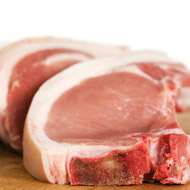
Retailers shun cheap imports for domestic pork products
Supermarkets are showing increasing support for British pork, despite there being cheaper imported supplies available, according to the latest Porkwatch survey.
Retailers have increased the amount of British bacon versus imported on their shelves from 44 per cent to 46 per cent. British sausages have been maintained at 83 per cent, British pork at 83 per cent, and British ham at 64 per cent.
Budgens, the Co-operative, M&S, Morrisons, Sainsbury's, Waitrose and Aldi were all found to stock 100 per cent British pork.
Lidl was not far behind, having increased its British pork from 89 to 92 percent. Tesco has maintained its proportion.
Commenting on the figures, National Pig Association (NPA) chairman Richard Lister said: "This is a remarkable testament to the quality of domestic product at a time when the gap between British farm-gate prices and the average European Union price is 26p a kilo, and the differential with Danish pork is over 35p a kilo."
According to the NPA, the only disappointing performer was ASDA, who showed a fall in every category.
"We recognise some retailers have an extremely cost-conscious customer base," said NPA chief executive Dr. Zoe Davies. "Nevertheless there is plenty of evidence to show the best way to grow the pork category is to major on British, so we will be urging ASDA to review its sourcing policies."
The Porkwatch survey is carried out every other month by pig industry levy body Bpex, who use professional researchers to measure supermarket shelf facings.
In recent months, British pig farmers have praised supermarkets for sticking to their pledges to restore customer trust, following the horse meat scandal in 2013.
"They have continued supporting the domestic product despite the provocation of a glut of cheap pork in continental cold stores and falls in the value of the euro, which together have created a significant temporary price differential," said the NPA.
Image (C) Stuart Webster



 The latest
The latest